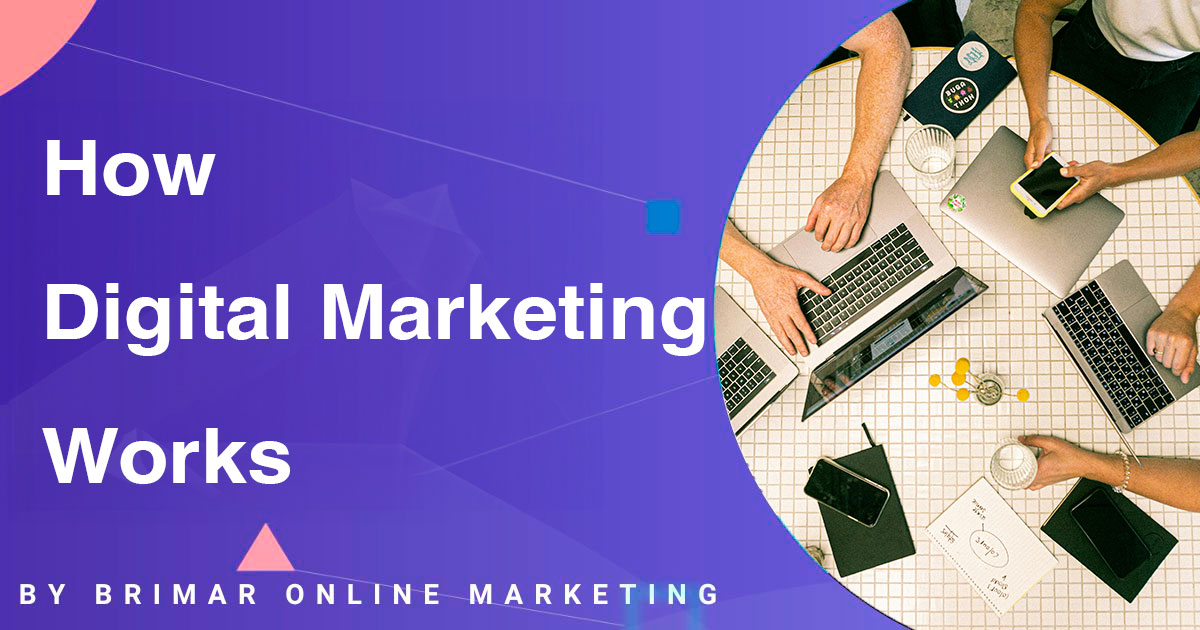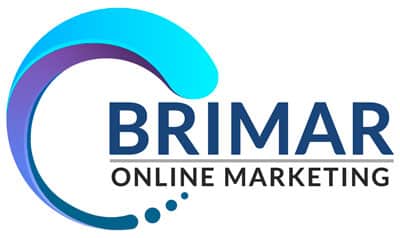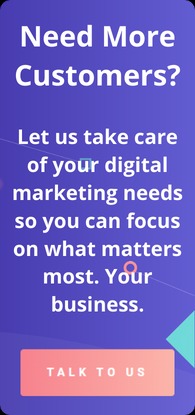
What is digital marketing?
Digital marketing refers to any marketing effort that utilizes online channels and electronic devices to promote products or services.
Unlike traditional marketing, which relies on physical mediums like print ads or billboards, digital marketing leverages the vast reach and interactivity of the internet.
Essentially, digital marketing allows businesses to connect with their target audience in a more direct, personalized, and cost-effective manner.
Digital marketing for businesses
Understanding digital marketing is crucial for businesses of all sizes.
With more people spending time online than ever before, digital channels have become essential for reaching and engaging with potential customers.
Here are a few reasons why understanding digital marketing is vital for businesses:
- Reach: Digital marketing enables businesses to reach a global audience, breaking geographical barriers and expanding their market reach beyond traditional boundaries.
- Targeting: Through digital marketing, businesses can precisely target their ideal customers based on demographics, interests, behaviors, and other factors, ensuring that their marketing efforts are more relevant and effective.
- Cost-effectiveness: Compared to traditional marketing channels like TV ads or print media, digital marketing often requires lower upfront costs and offers better ROI, making it a more cost-effective option for businesses, especially small and medium-sized enterprises (SMEs).
- Measurability: Digital marketing allows businesses to track and measure the performance of their campaigns in real-time, providing valuable insights into what’s working and what’s not. This data-driven approach enables businesses to optimize their strategies for better results.
- Competitive Advantage: In today’s competitive market landscape, businesses that embrace digital marketing gain a competitive edge by staying relevant, visible, and accessible to their target audience.
In essence, understanding digital marketing empowers businesses to connect with their audience, generate leads, drive sales, and ultimately, achieve their business goals in the digital realm.
Understanding the Digital Landscape
The digital world encompasses the vast ecosystem of online platforms, channels, and technologies that people use to communicate, interact, and consume information.
From social media networks and search engines to websites, mobile apps, and email services, the digital landscape is constantly evolving, offering businesses endless opportunities to connect with their audience.
Over the past decade, there has been a significant shift from traditional to digital marketing as consumers increasingly turn to the internet for information, entertainment, and shopping.
While traditional marketing methods still hold value, digital marketing offers unparalleled reach, targeting capabilities, and measurability, making it a preferred choice for modern businesses looking to adapt to changing consumer behaviors.
Digital marketing comprises several key components, each playing a unique role in a business’s overall marketing strategy:
- Search Engine Optimization (SEO): SEO involves optimizing a website’s content and structure to improve its visibility and ranking on search engine results pages (SERPs), thereby attracting organic traffic and increasing brand awareness.
- Pay-Per-Click Advertising (PPC): PPC advertising allows businesses to display ads on search engines and other online platforms, paying only when users click on their ads. This targeted approach helps drive qualified traffic to websites and generate leads or sales.
- Social Media Marketing: Social media marketing involves leveraging social media platforms like Facebook, Instagram, Twitter, and LinkedIn to engage with audiences, build brand awareness, and drive website traffic or conversions through organic and paid content.
- Content Marketing: Content marketing is a strategy that involves producing and sharing useful, appropriate, and regular content to appeal and keep a specific group of people. This can include blog posts, articles, videos, infographics, and more, designed to educate, entertain, or inspire audiences.
- Email Marketing: Email marketing involves sending targeted messages and promotional offers to a subscriber list, nurturing leads, and fostering customer relationships through personalized communication.
- Analytics and Tracking: Analytics tools allow businesses to track and analyze various metrics such as website traffic, user engagement, conversion rates, and ROI, enabling data-driven decision-making and continuous optimization of digital marketing strategies.
By understanding these key components and how they work together, businesses can develop comprehensive digital marketing strategies that effectively reach and engage their target audience across multiple online channels.
Do You Need to Attract More Customers?
Get more customers by taking advantage of our efficient digital marketing services. Our services include SEO, PPC Management, Web Design and Development, Social Media Marketing, Email Marketing, and more.
The Role of Websites
Having a website is absolutely crucial for any business looking to thrive online.
Without a website, you risk being invisible to a vast audience that relies on the internet to find products, services, and information.
Having a professional website not only enhances your credibility but also helps establish trust with your audience.
It’s a platform where you can showcase your brand, tell your story, and highlight what sets you apart from competitors.
Plus, with the majority of consumers researching products and services online before making a purchase, your website acts as a valuable asset in influencing their buying decisions.
Elements of an Effective Website
An effective website is more than just a pretty design.
It’s about creating an intuitive, user-friendly experience that engages visitors and drives them toward your desired actions.
Here are key elements every effective website should have:
- Clear Navigation: Visitors should be able to easily find what they’re looking for without getting lost. Clear navigation menus and a logical site structure are essential.
- Compelling Content: High-quality, relevant content that speaks to your target audience is vital for keeping visitors engaged and encouraging them to explore further.
- Responsive Design: With the increasing use of mobile devices, your website must be mobile-friendly and responsive, adapting seamlessly to different screen sizes.
- Call-to-Action (CTA): Every page should have a clear CTA guiding visitors towards the next step, whether it’s making a purchase, contacting you, or signing up for a newsletter.
- Contact Information: Make it easy for visitors to get in touch with you by prominently displaying your contact information, including phone number, email, and physical address if applicable.
How Websites Contribute to Digital Marketing Strategies
Websites are the cornerstone of digital marketing strategies, serving as the central hub where all online activities lead back to.
Here’s how websites contribute to digital marketing success:
- Brand Visibility: A well-optimized website improves your visibility in search engine results, making it easier for potential customers to find you online.
- Lead Generation: By offering valuable content and engaging CTAs, your website helps capture leads and nurture them through the sales funnel.
- Content Distribution: Your website is the primary platform for publishing and distributing content, whether it’s blog posts, videos, or downloadable resources, to attract and retain visitors.
- Data Collection: Websites enable you to gather valuable data about your audience through analytics tools, helping you understand their behavior and preferences to optimize your marketing efforts.
- Conversion Optimization: Through A/B testing and other optimization techniques, you can continually refine your website to improve conversion rates and maximize the return on your digital marketing investment.
Search Engine Optimization (SEO)
What is SEO?
Search Engine Optimization (SEO) is organically optimizing your website to rank higher in search engine results pages (SERPs).
In simpler terms, it’s about making your website more visible to people searching for products or services related to your business.
Importance of SEO in Digital Marketing
SEO plays a critical role in digital marketing because the majority of online experiences begin with a search engine.
When your website ranks higher in search results, you attract more organic traffic, increase brand visibility, and ultimately drive more leads and sales.
Unlike paid advertising, which stops generating traffic once you stop paying, SEO provides long-term, sustainable results, making it a valuable investment for any business.
Basics of Optimizing Content for Search Engines
Optimizing content for search engines involves several key strategies:
- Keyword Research: Identify relevant keywords and phrases that your target audience is likely to use when searching for your products or services.
- On-Page Optimization: Optimize individual pages of your website by including target keywords in page titles, meta descriptions, headings, and throughout the content.
- High-Quality Content: Create valuable, informative content that addresses the needs and interests of your target audience. Focus on providing solutions and answering common questions.
- Mobile-Friendliness: Ensure your website is mobile-friendly, as Google prioritizes mobile-friendly websites in search results.
- Website Speed: Improve website speed and performance to provide a better user experience and meet Google’s ranking criteria.
By implementing these basic SEO practices, you can improve your website’s visibility in search results and attract more organic traffic over time.
Pay-Per-Click Advertising (PPC)
What is PPC?
Pay-per-click advertising, or PPC, is a digital marketing model in which advertisers pay a fee each time their ad is clicked.
It’s a way of buying visits to your site rather than attempting to “earn” those visits organically.
Search engine advertising is one of the most popular forms of PPC.
It allows advertisers to bid for ad placement in a search engine’s sponsored links when someone searches for a keyword related to their business.
Advantages of PPC Campaigns
PPC campaigns offer several advantages for businesses:
- Immediate Results: Unlike SEO, PPC can drive immediate traffic to your website once your campaign is live.
- Targeted Advertising: PPC platforms allow precise targeting based on factors like keywords, location, device, and even time of day, ensuring your ads reach the right audience.
- Measurable ROI: With PPC, you can track exactly how much you’re spending and what you’re getting in return, making it easy to measure the ROI of your campaigns.
- Control and Flexibility: You have full control over your budget, allowing you to adjust it at any time based on performance. You can also tweak your ads and targeting parameters to optimize results.
- Brand Visibility: Even if users don’t click on your ad, they still see your brand, which can lead to increased brand awareness and recognition.
How PPC Fits into Digital Marketing Strategies
PPC plays a crucial role in digital marketing strategies by complementing other channels such as SEO, social media, and content marketing.
Here’s how it fits in:
- Increased Visibility: PPC can help boost your visibility on search engines, especially for competitive keywords where organic rankings may take time to achieve.
- Targeted Traffic: By targeting specific keywords and demographics, PPC drives highly targeted traffic to your website, increasing the likelihood of conversions.
- Data Insights: PPC platforms provide valuable data and insights into user behavior and preferences, which can inform other marketing efforts.
- Synergy with Other Channels: PPC can work hand in hand with other digital marketing channels. For example, you can use PPC to promote content created as part of your content marketing strategy or to amplify the reach of your social media campaigns.
- Quick Testing and Iteration: PPC allows for quick testing of different ad creatives, messaging, and landing pages, enabling you to iterate and optimize your campaigns for better performance over time.
Social Media Marketing

Social media platforms have become integral to our daily lives, offering a diverse range of channels for communication, networking, and entertainment.
From Facebook and Twitter to Instagram, LinkedIn, and TikTok, each platform caters to different demographics and interests.
They enable users to connect with friends and family, discover new content, and engage with brands and businesses.
Importance of Social Media Marketing
Social media marketing is essential for businesses of all sizes for several reasons:
- Reach and Engagement: Social media platforms have billions of active users, providing businesses with unprecedented reach and opportunities for engagement.
- Brand Building: Social media allows businesses to humanize their brand, build relationships with customers, and establish themselves as authorities in their industry.
- Targeted Advertising: Social media platforms offer sophisticated targeting options based on demographics, interests, and behaviors, allowing businesses to reach their ideal audience with precision.
- Customer Feedback and Insights: Social media provides a direct line of communication between businesses and customers, enabling real-time feedback, insights, and customer service.
- Drive Traffic and Conversions: Social media can drive traffic to your website, blog, or online store, ultimately leading to conversions and sales.
Tips for Effective Social Media Marketing Campaigns
Here are some tips to help you run effective social media marketing campaigns:
- Know Your Audience: Understand your target audience’s demographics, interests, and behaviors to tailor your content and messaging accordingly.
- Create Engaging Content: Produce high-quality, engaging content that resonates with your audience and encourages likes, shares, and comments.
- Be Consistent: Maintain a consistent posting schedule to keep your audience engaged and your brand top of mind.
- Use Visuals: Visual content such as images, videos, and infographics tends to perform better on social media, so incorporate visuals into your posts whenever possible.
- Interact and Engage: Don’t just broadcast messages; actively engage with your audience by responding to comments, messages, and mentions in a timely manner.
- Utilize Hashtags: Use relevant hashtags to increase the visibility of your posts and reach a wider audience.
- Monitor and Measure: Track the performance of your social media campaigns using analytics tools and adjust your strategy based on insights and results.
- Stay Up-to-Date: Social media trends and algorithms are constantly evolving, so stay informed and adapt your strategy accordingly to stay relevant and effective.
Content Marketing
What is Content Marketing?
Content marketing is all about creating and distributing valuable, relevant, and consistent content to attract and retain a clearly defined audience.
Instead of directly pitching products or services, content marketing focuses on providing useful information, solving problems, or entertaining the audience.
This approach aims to build trust, credibility, and loyalty with potential customers, ultimately driving profitable customer action.
Role of Content in Digital Marketing
Content is the heart and soul of digital marketing strategies.
It serves as the foundation upon which businesses engage with their audience, build relationships, and establish authority in their industry.
Quality content not only attracts visitors to websites and social media channels
but also keeps them engaged and encourages them to take desired actions,
such as making a purchase, signing up for a newsletter, or sharing content with others.
In essence, content is the fuel that powers digital marketing success.
Types of Content and How They Drive Engagement
- Blog Posts: Informative articles that address specific topics relevant to the target audience. Blogs help to educate, inform, and entertain readers while showcasing the expertise and personality of the brand.
- Infographics: Visual representations of data, statistics, or processes that are easy to digest and share. Infographics are highly engaging and effective in conveying complex information in a visually appealing format.
- Videos: Dynamic and interactive content that captivates audiences and encourages social sharing. Whether it’s tutorials, product demonstrations, or behind-the-scenes glimpses, videos have the power to evoke emotions and build connections with viewers.
- Social Media Posts: Short-form content shared on social media platforms to spark conversations, build brand awareness, and drive traffic to other digital assets. From witty tweets to stunning Instagram photos, social media posts help brands stay top-of-mind and interact with their audience in real-time.
- Ebooks and Whitepapers: In-depth resources that provide comprehensive insights into industry trends, best practices, or solutions to common challenges. Ebooks and whitepapers are valuable assets that position brands as thought leaders and generate leads by offering gated access to exclusive content.
- Webinars and Podcasts: Live or recorded audiovisual presentations that offer educational or entertaining content to listeners. Webinars and podcasts facilitate direct engagement with audiences, allowing for real-time interaction, Q&A sessions, and guest interviews.
By leveraging a diverse range of content types, businesses can connect with their audience at various touchpoints throughout their digital journey, foster meaningful relationships, and drive long-term success.
Email Marketing
What is Email Marketing?
Email marketing is a digital marketing strategy that involves sending targeted messages or campaigns to a specific group of individuals via email.
These messages can include promotional offers, product updates, newsletters, or personalized content tailored to the recipient’s interests and preferences.
Email marketing allows businesses to communicate directly with their audience, nurture leads, build brand loyalty, and drive conversions effectively.
Benefits of Email Marketing Campaigns
- Direct Communication: Email provides a direct line of communication to reach subscribers’ inboxes, ensuring messages are delivered straight to the intended recipients.
- Targeted Messaging: With segmentation and personalization capabilities, businesses can tailor email content to specific audience segments, increasing relevance and engagement.
- Cost-Effectiveness: Compared to traditional marketing channels, email marketing is a cost-effective way to reach a large audience with minimal investment in resources or advertising spend.
- Measurable Results: Email marketing platforms offer robust analytics and tracking tools, allowing businesses to monitor campaign performance, track open rates, click-through rates, and conversion metrics in real-time.
- Relationship Building: Regularly engaging with subscribers through valuable content and personalized communication helps businesses build trust, loyalty, and long-term relationships with their audience.
- Drive Conversions: Email marketing campaigns are highly effective at driving conversions, whether it’s making a purchase, signing up for a webinar, or downloading a resource.
By strategically guiding subscribers through the buyer’s journey, businesses can nurture leads and encourage desired actions.
Best Practices for Successful Email Marketing
- Build a Quality Email List: Focus on growing an opt-in email list of engaged subscribers who have consented to receive communications from your brand.
- Personalize Content: Tailor email content based on subscriber preferences, behaviors, and demographics to increase relevance and engagement.
- Use Compelling Subject Lines: Craft attention-grabbing subject lines that entice recipients to open your emails and explore the content inside
- Design Mobile-Friendly Emails: Optimize email designs for mobile devices to ensure a seamless viewing experience for subscribers on smartphones and tablets.
- Test and Iterate: Continuously test different elements of your email campaigns, such as subject lines, CTAs, and content formats, to optimize performance and drive better results.
- Comply with Regulations: Ensure compliance with email marketing laws and regulations, such as GDPR and CAN-SPAM, by obtaining consent, providing opt-out options, and respecting subscribers’ privacy preferences.
By following these best practices and leveraging the power of email marketing, businesses can effectively engage with their audience, nurture leads, and drive meaningful conversions.
Analytics and Tracking
Analytics in Digital Marketing
Analytics play a crucial role in understanding how your strategies are performing and where to focus your efforts for maximum impact.
By analyzing data, businesses can gain valuable insights into customer behavior, campaign effectiveness, and overall ROI.
Analytics provide concrete evidence of what’s working and what needs improvement, allowing for informed decision-making and strategy refinement.
Tools for Tracking and Measuring Success
There’s a plethora of tools available to track and measure the success of digital marketing efforts.
Google Analytics is a popular choice, offering robust features for tracking website traffic, user behavior, and conversion metrics.
Social media platforms like Facebook and Instagram also provide built-in analytics tools to monitor engagement, reach, and audience demographics.
Additionally, marketing automation platforms such as HubSpot and Marketo offer comprehensive tracking capabilities across various channels, enabling businesses to streamline their analytics process and gain a holistic view of their marketing performance.
Using Data to Optimize Digital Marketing Strategies
Data-driven decision-making is the cornerstone of effective digital marketing.
By analyzing the data collected from various channels, businesses can identify trends, patterns, and areas for improvement.
For example, analyzing website traffic can reveal which pages are performing well and which need optimization.
Similarly, tracking email open rates and click-through rates can help refine email marketing campaigns for better engagement.
By continually monitoring and analyzing data, businesses can iterate on their strategies, allocate resources more efficiently, and ultimately drive better results.
Conclusion
In this beginner’s guide to digital marketing, we’ve covered the fundamentals of how digital marketing works and why it’s essential for businesses to understand.
We explored the various components of digital marketing, including websites, SEO, PPC advertising, social media marketing, content marketing, email marketing, and the crucial role of analytics and tracking.
Now that you have a foundational understanding of digital marketing, it’s time to put your knowledge into action.
Whether you’re a small business owner, entrepreneur, or marketing professional, implementing digital marketing strategies can help you reach your target audience, generate leads, and grow your business.
Don’t be afraid to experiment and try new tactics – digital marketing is constantly evolving, and staying agile is key to success.
If you’re ready to take your digital marketing efforts to the next level but need guidance or support, don’t hesitate to reach out to us at Brimar Online Marketing.
Our team of experts specializes in helping businesses leverage the power of digital marketing to achieve their goals.
Whether you need assistance with website optimization, SEO strategies, PPC campaigns, or analytics implementation, we’re here to help you succeed.
Contact us today to learn more and start driving real results with digital marketing.
Our Digital Marketing Services Have Helped Our Clients Increase Their Revenue!
“I highly recommend Brimar if your looking to grow your online business. You will be satisfied with the high level of expertise and high quality of services. It has helped my business grow by leaps and bounds.”
CEO





